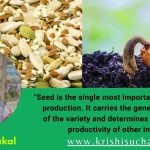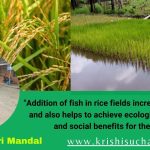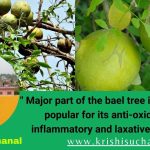Quality seeds and it’s importance in food self sufficiency

Seed is a fertilized matured ovule together covered with seed coat is called seed or it is a propagating material i.e., part of agriculture, sericulture, silviculture and horticultural plants used for sowing or planting purpose. Thus, seed is the most vital and crucial input for crop production, one of the ways to increase the productivity without adding appreciably to the extent of land now under cultivation by planting quality seed. Seeds have always been the key ingredient in the establishment, expansion, and improvement of crop production.
Quality seed can be defined as varietally pure with a high germination percentage, free from diseases and disease organisms, with a proper moisture content and weight. High quality seed is the seed having good germination percentage, good viability, good physical purity, and are disease and pest free, having high genetic purity and have sufficient moisture content for better germination. Seed production which follows efficient certification procedures plays a major role in the increase of food production of our country. Quality of seed is important for better crop stand and high input efficiency. Producing quality seeds is an effective tool to address the issues of self-sufficiency, food security and economic development.
For the assessment of quality seeds, main things that matter are purity, germination and moisture content of seed lot. For that, certified seeds are highly used, which have really purity. Certified seeds are of mainly four types: Nucleus seed, Breeder’s seed, Foundation Seed (I and II) and Certified Seed (I and II). If such seeds are available to the farmers, then it can be advantageous for them in many perspectives like uniform plant population and maturity. To be able to produce more and prosper, farmers must use pure and healthy seeds as per the certification norms which have a standard germination percentage. Good quality seeds are those which have genetic and physical purity, health standards, and moisture content in accordance with seed certification standards.
Quality seed increases production of crops by about 20%. Farmers make arrangements for many inputs but quality seed is the most essential input among all the inputs. If the seed is of bad or inferior quality, then labour and other expenses are in vain. Quality seed help in better crop stand establishment, which will enhance the yield of crop. High quality seed can able to germinate at harsh condition like low moisture, insect pest infestation as compare to low quality seed.
There is great example of effect of low quality seed ,that is Garima hybrid variety of rice(2019). Due to high demand of this variety Garima, the company packed other variety of rice as Garima that’s why problem was seen. An investigation carried out by ghe ministry revealed that the seed dealer had sold fake Garima brand paddy Seeds to farmer during planting season . A preliminary study showed that Garima planted on 1404 hectares produced empty grains. The government fact finding team found that the Garima seed supplies to farmers this year were fake as they failed genetics testing also known as DNA testing with the original variety.
Writer: Rajesh Gupta (Student, Bsc Ag 4th sem, IAAS, Paklihawa Campus)

 एउटा यस्तो विषालु भ्यागुता, जसको मुल्य नै पर्छ ३ लाख, जान्नुहाेस्
एउटा यस्तो विषालु भ्यागुता, जसको मुल्य नै पर्छ ३ लाख, जान्नुहाेस्  भोलि र पर्सि बालबालिकालाई भिटामिन ए खुवाइदै
भोलि र पर्सि बालबालिकालाई भिटामिन ए खुवाइदै  खगराज अधिकारी गण्डकीको मुख्यमन्त्री नियुक्त
खगराज अधिकारी गण्डकीको मुख्यमन्त्री नियुक्त  सुनसरीमा दुवै पक्षबीच सहमति, कर्फ्यु खुकुलो हुदै
सुनसरीमा दुवै पक्षबीच सहमति, कर्फ्यु खुकुलो हुदै  स्टेफेनको शतकमा आयरल्याण्ड वोल्भ्सले नेपाल ए लाई दियो २८५ रनको लक्ष्य
स्टेफेनको शतकमा आयरल्याण्ड वोल्भ्सले नेपाल ए लाई दियो २८५ रनको लक्ष्य 



[…] seeds are produced manually by modifying the plant structure by removal of male organ from female plant […]